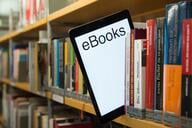You have /5 articles left.
Sign up for a free account or log in.
Despite an abiding preference for the traditional book, I started using an e-reader about seven months ago -- and have found it insinuating itself into daily life, just as a key chain or wallet might. For there is a resemblance. A key chain or wallet (or purse) is, in a sense, simply a tool that is necessary, or at least useful, for certain purposes. But after a while, each becomes more than that to its owner. To be without them is more than an inconvenience. They are extensions of the owner’s identity, or rather part of its infrastructure.
Something like that has happened with the e-reader. I have adapted to it, and vice versa. Going out into the world, I bring it along, in case there are delays on the subway system (there usually are) or my medical appointment runs behind schedule (likewise). While at home, it stays within reach in case our elderly cat falls asleep in my lap. (She does so as often as possible and has grown adept at manipulating my guilt at waking her.) Right now there are about 450 items on the device. They range from articles of a few thousand words to multivolume works that, in print, run to a few hundred pages each. For a while, my acquisition of them tended to be impulsive, or at least unplanned. Whether or not the collection reflected its owner's personality, it certain documented his whims.
But over the past few weeks, this has changed. I have been systematically building up a collection of what might be called “hand-crafted digital texts,” if that’s not too strange a way to put it. Most of them would not be available from an e-book vendor. I’ve assembled and prepared them with care; they now add up to a portable library reflecting both my longstanding interests and recent surges of curiosity.
It has cost nothing to do this, apart from a little time and effort. I will explain the technique involved in it shortly. But first, a few words on the circumstances that led to its development.
Only a handful of the e-books I have acquired cost more than $10, and most were free. You can download many titles at no charge from Project Gutenberg, the Internet Archive, and Google e-books. These are public domain texts, as are most of the free digital texts available from Amazon or Barnes and Noble.
There is a considerable overlap in the inventory of free materials among these sources. At the same time, the range of materials is wildly uneven from field to field. The selection of British and American literature through the early 20th century, for example, is pretty extensive. The available materials in history or philosophy seem much more erratic. And certain areas are well-represented to a rather peculiar degree. Anyone wanting to learn the secret rituals and doctrines of the Freemasons is in luck. (I have downloaded some of this material and one of these days will find out what my grandfather was up to at his lodge meetings.)
This makes acquiring a large, if somewhat eccentric, collection of works quite easy. But with free e-books, you often get what you pay for -- at least as regards basic readability. Books that have been scanned and then converted into plain text using optical character-recognition software are particularly exasperating. A page number, or the caption to an illustration, may land in the middle of a sentence. Random strings of letters and numbers will appear every so often. Which is O.K. if you enjoy the challenge of figuring out that “vvn3n3vr” was, in the original text, the word “whenever.” (Otherwise, not.)
Things aren’t always that egregious. Some free texts are fairly clean, or have blemishes it proves easy to ignore. But I’ve given up on more than a few -- and fulminated aloud about it often enough that someone familiar with my complaint passed along John Esposito’s article “The Terrible Price of Free,” which appeared recently at The Scholarly Kitchen, a blog run by the Society for Scholarly Publishing.
Rather than gripe, Esposito calls for action. He proposes the creation of “a branded collection of reader’s editions for popular public-domain works.” They would need to be available for free, he says, just as the defective versions have been; otherwise, the corrupt texts will continue to have an advantage in circulating. And he makes what sound like reasonable suggestions about how this new edition should be prepared:
“I would like to see an authoritative organization — the Modern Language Association, perhaps? — take this on, perhaps by beginning with a review of the texts in Project Gutenberg. There would be a one-time cost to get this going and then a small cost for maintenance. There is no self-evident way to recoup these costs. The number of titles would be in the range of 200-300. Titles that pose challenges (Shakespeare, translations) could be put off for a later time. Perhaps the founders of Google, whose personal wealth will someday be the subject of literary epics, would underwrite this. This is what is meant by ‘giving back’ after you have taken away.”
It would be a step in the right direction. The problem is not confined to free texts, however. Entrepreneurs are now publishing e-versions of “orphaned” books (that is, works still under copyright, for which no copyright holder can now be found) and selling them at low cost. At times they do good work: the digital books are clean, well-presented, and come with a table of contents that includes links to individual chapters or documents within a collection. They are usually cheaper than buying a secondhand copy -- and the digital publisher has added a certain amount of value to the commodity.
But not always, by any means. Some of the editions are wretched. Paying even one dollar for a completely worthless version of a book you want is disproportionately infuriating. A piece of advice: always, always take a look at the free sample pages that an e-book vendor provides before spending a cent. That option is easy to overlook, but it will spare you the remorse of feeling like a chump. (An e-book publisher who doesn’t provide a sample ought to be regarded with great suspicion.)
Once in the habit of using an e-reader, I wanted to keep adding to the stockpile of material stored on it. But the problems began to be distracting, and in any case, much of what I wanted to read was simply not published in e-book format.
Some of it was available online, however. One day, upon discovering that Althusser’s “Contradiction and Overdetermination” was available on a website, I wondered if it would be possible to download it to my e-reader. Evidently not -- at least, not directly.
But with some experimentation, I figured out how to add such material to my device in a format that was attractive and readable, and soon had another 200 items on hand for instant access. My computer skills are minimal, not to say primitive, and it is quite possible that I have merely reinvented the wheel. But here's what's involved, in case the process is useful to anyone else.
First, highlight the text you want to acquire and copy it. Then open a Word document and paste the text into it. Save this, giving the document the title you would want it to have when appearing on the list of items in your e-book collection – for example, “Louis Althusser, Contradiction and Overdetermination (1962).”
At this stage, the document will contain both the text you want to read and a certain amount of clutter – images, ads, links to other pages, etc. Go through it and remove the junk. (This is where the “hand-crafting” part begins.) The next step is to adjust the size of the text to make it easy to take on your e-reader. This involves enlarging it by highlight the whole text again, then adjusting the font size. Most of the time, I will convert the document to 28-point type; this shrinks by roughly a third once the text has reached my Kindle.
Finally, save the whole thing as a PDF and transfer it to your e-reader. Depending on what device you are using, this may be possible by wireless, through the USB port, or both. If all has gone well, the text will now be part of your collection.
It may take a bit of practice to create something in a format you find appealing. The skill is easy to pick up, though. And I've found it much easier to engage with a long or dense text this way than while trying to read it on a computer screen. Eventually the selection and quality of e-books might improve -- but until then, readers have good reason to experiment with doing things themselves.




